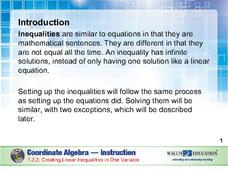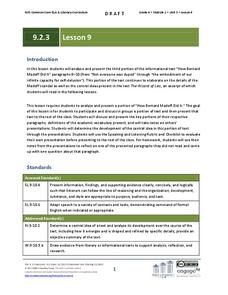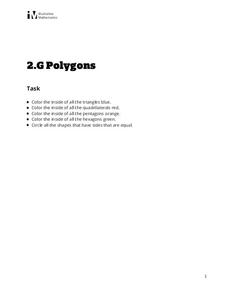K12 Reader
The Apprentice System
Readers are asked to identify the central idea and two supporting details that develop this main idea in an article about the apprentice system popular in colonial America.
Teacher Web
Inferring Character Traits
Learning how to draw inferences from text is a key reading comprehension skill. Here's a worksheet that gives readers a chance to practice by offering 20 descriptive sentences and asking kids to identify the inferred character...
Ask a Biologist
Human Skeleton Anatomy Activity
Young biologists piece together the puzzle of the human body with this simple anatomy worksheet. Presented with a picture of the human skeleton, students are challenged with the task of correctly identifying the 27...
K-5 Math Teaching Resources
Mini Math Word Wall
Provide a little extra support for your emerging mathematicians with a personal word wall. Including graphics and images that support children with learning to count, identify colors and shapes, and read high frequency words,...
Student Handouts
St. Patrick's Day Nouns: Common or Proper?
Is leprechaun a common or proper noun? This is just one of the nouns that learners must identify as common or proper for this St. Patrick's Day-themed exercise.
Illustrative Mathematics
Right Triangles Inscribed in Circles I
One of the basic properties of inscribed angles gets a triangle proof treatment in a short but detailed exercise. Leading directions take the learner through identifying characteristics of a circle and how they relate to angles and...
Do2Learn
Home & School: Food
What a treat! Help learners identify some of their favorite foods with this set of 24 picture cards. The set includes images of everything from pizzas and hamburgers to grapes and carrots.
Do2Learn
Home & School: Home
From doors and lamps to sinks and chairs, review some of the most common items you'll find in someone's home with this collection of picture cards. It includes 24 images and vocabulary words for learners to place in...
Positively Autism
Travis the Train Delivers Shapes
Triangle, circle, square, rectangle, oval, star, diamond, heart. Travis the Train delivers eight shapes for learners with autism to identify. Part of a learning unit on shapes.
BW Walch
Creating Linear Inequalities in One Variable
Just when a young mathematician starts to feel comfortable turning word problems into linear equations, shake things up and throw inequalities in the mix. This excellent, instructive presentation takes the steps for solving an...
EngageNY
Grade 9 ELA Module 1, Unit 2, Lesson 3
How do writers develop a central idea in a text? How can readers identify this central idea? These are the challenges class members tackle as they continue their analysis of "Letter One" from Rainer Maria Rilke's Letters to a Young Poet.
Math Drills
Classifying Prisms and Pyramids
Young geometers identify prisms and pyramids based on the number of edges they have. Answers vary from hexagonal and rectangular prisms to pentagonal and octagonal pyramids.
Institute for the Professional Development of Adult Educators
Using Context Clues with Signal Words
When you come across an unfamiliar word in a text, do you skip it and move on? Practice using context clues to identify words you don't know with a thorough set of language arts lessons. The resource reinforces close reading and critical...
Museum of Tolerance
Family Role Model Activity
What does is take to be a role model? Through grand conversation, and the use of books and a graphic organizer, scholars find out and apply the requirements to identify a role model within their family. They then journey through the...
Plum Tree
Teaching Your Child How to "Deep Breathe"
Feeling stressed, angry, or nervous? It's time to practice the exercise detailed in Deep Breathe to breathe your cares away. The activity brings the focus back to one's self and identifies the importance of...
EngageNY
Grade 9 ELA Module 2, Unit 3, Lesson 9
Are we interested in crime stories because we either identify with the victims or enjoy watching the rich suffer? Do we feel guilty and want someone to take our blame and let us feel innocent? Groups investigate how the author of "How...
English Worksheets Land
Point of View
Point of view—first, second, and third person—is the focus of a learning exercise in which scholars read, identify, and color sentences.
EngageNY
Construct and Apply a Sequence of Rigid Motions
Breaking the rules is one thing, proving it is another! Learners expand on their previous understanding of congruence and apply a mathematical definition to transformations. They perform and identify a sequence of transformations and use...
Tech Museum of Innovation
Energy at Play
Get the ball rolling and challenge your class to figure out how to make a ball move. The instruction segment is between two STEM activities devoted to doing just that. The first is simple and involves making a ball move from some...
Mathed Up!
Mixed Transformations
Viewers learn how to identify and perform a variety of transformations with a video that provides seven items on transformations. Pupils demonstrate their understanding of dilations, reflections, rotations, and translations. The video...
National Endowment for the Humanities
Elements of the Epic Hero Cycle
Here's a handy worksheet applicable to any study of epic heroes, including those in epic poetry. Readers record examples from their text that identify the quest, the tests, helpers and companions, as well as the low point, the...
Illustrative Mathematics
Polygons
Identify shapes based on their attributes. Second graders are tasked to color triangles, quadrilaterals, pentagons, and hexagons specific colors. The one thing these shapes have in common? They are all polygons.
Fluence Learning
Writing an Argument: Free Speech
How do you assess whether pupils have mastered certain concepts and skills? Designing a performance task that asks learners to demonstrate their skills and providing writers with a rubric that identifies these skills and provides...
Common Core Sheets
Declarative, Interrogative and Exclamatory Sentences
It's time to identify these sentences as interrogative, exclamatory, or declarative based on their ending punctuation.
Other popular searches
- Identifying Context Clues
- Identifying the Main Idea
- Identifying Main Ideas
- Identifying Parts of Speech
- Identifying Nouns
- Identifying Point of View
- Identifying Topic Sentences
- Identifying Mood
- Identifying Parts of Plants
- Identifying Author's Purpose
- Identifying Authors Purpose
- Identifying Emotions

























